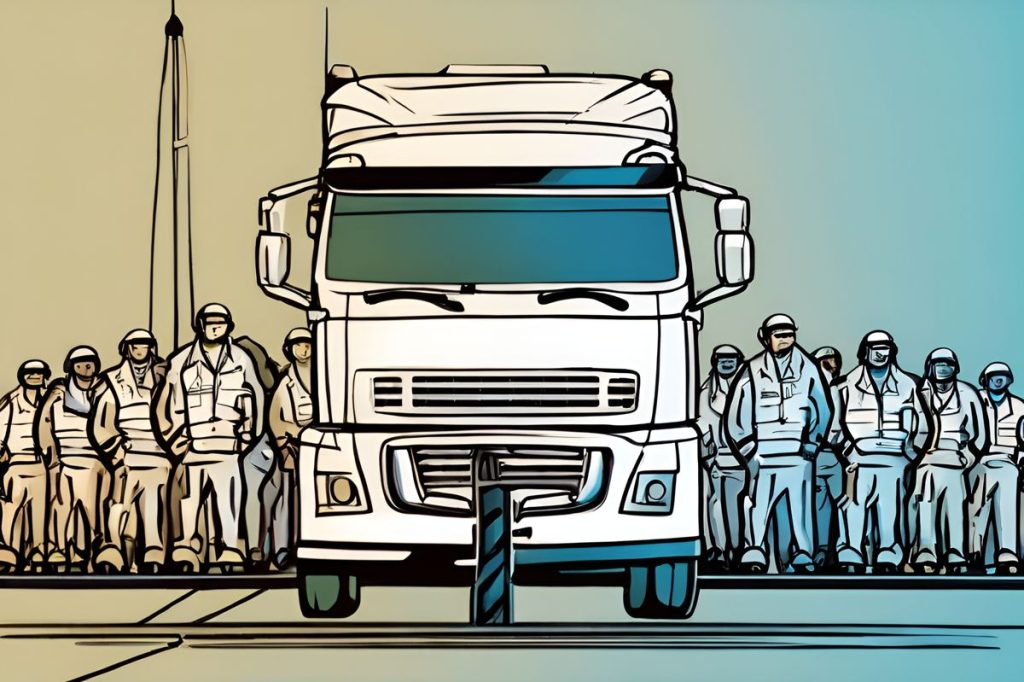Fuel tanker drivers at Vasiliko terminal are striking due to harsh working conditions, such as lack of breaks, tight delivery schedules, and unsafe parking. They demand immediate improvements in safety and health standards to ensure their well-being.
Why are fuel tanker drivers at Vasiliko terminal on strike?
Fuel tanker drivers at Vasiliko terminal are on strike to protest inhumane working conditions, including insufficient breaks for rest and meals, tight delivery schedules posing health risks, and unsafe parking arrangements that increase accident risks. They demand immediate improvement in health and safety standards.
Unrest at Vasiliko Terminal
Early Tuesday morning, at the Vasiliko terminal of Hellenic Petroleum, an unexpected work stoppage marked the beginning of a strike by tanker drivers. This action wasn’t on the schedule but spoke volumes of the deep-seated issues faced by the employees. Drivers from various companies, including Cypoil Trading Ltd, Go Now, Michaelas, Staroil, and Meleths, have made it clear that they are striking as a form of protest against what they consider to be inhumane working conditions.
The grievances outlined by the drivers paint a picture of a difficult work environment. They’ve cited the inability to take breaks for basic needs and a concerning lack of time allocated between deliveries for rest and meals. Such conditions not only affect their well-being but also present potential health risks, as proper breaks are essential for maintaining focus and safety on long hauls.
Safety and Health Concerns Highlighted
In addition to the strain of tight schedules, the drivers are protesting against parking arrangements that require them to park on a turn outside the terminal. This risky setup increases the likelihood of accidents, placing the drivers in daily jeopardy of collision with other tankers or vehicles. The need for improved safety measures is evident, and the drivers’ call to action has resonated with an urgency for change.
In response to these challenges, the drivers have reached out to the labour inspection department and have directly appealed to the minister of labour. Their demands are clear: immediate attention to the critical health and safety issues that they face every day. The drivers’ statement reflects a common theme in labour disputes worldwide, where workers seek to have their voices heard and their work conditions improved to a standard that respects their health and dignity.
Industry-Wide Implications
The strike at Vasiliko terminal is symptomatic of larger issues that plague the transportation and logistics industry. Long hours, tight schedules, and high-pressure environments are common, but they also bring to light the importance of occupational health and safety regulations. The demands of tanker drivers for better working conditions are more than just a local issue—they resonate with workers in similar situations around the globe.
As industries continue to grow and the demand for quick and efficient transportation of goods remains high, the balance between operational efficiency and employee welfare continues to be a challenging frontier. The resolution of the strike and the handling of the drivers’ concerns may serve as a benchmark for similar labour issues elsewhere.
Responses Awaited
The outcome of this strike and the authorities’ response may set the tone for future industrial relations within the sector. The drivers have made their stance known, and the ball is now in the court of the labour department and the minister of labour to address these concerns. The industry, the workers, and the public await a resolution that can hopefully lead to safer and more humane working conditions for tanker drivers.
Why are fuel tanker drivers at Vasiliko terminal on strike?
Fuel tanker drivers at Vasiliko terminal are on strike to protest inhumane working conditions, including insufficient breaks for rest and meals, tight delivery schedules posing health risks, and unsafe parking arrangements that increase accident risks. They demand immediate improvement in health and safety standards.
What specific grievances have the tanker drivers outlined?
The tanker drivers have cited the inability to take breaks for basic needs, a lack of time allocated between deliveries for rest and meals, and unsafe parking arrangements that increase the likelihood of accidents. These conditions not only impact their well-being but also pose significant health risks and safety concerns.
How have the drivers responded to the challenges they are facing?
The drivers have reached out to the labour inspection department and directly appealed to the minister of labour to address the critical health and safety issues they face daily. Their demands focus on immediate attention to improving working conditions to ensure their well-being and safety while on the job.
What are the potential industry-wide implications of this strike?
The strike at Vasiliko terminal highlights larger issues within the transportation and logistics industry regarding working conditions, occupational health, and safety regulations. The demands of the tanker drivers for better conditions resonate with workers worldwide facing similar challenges. The resolution of this strike may serve as a benchmark for addressing labor issues in similar industries globally.

